PRC Dialogue Series
25.11.2025: Nino Künzli - Do Scientists lose Control over Scientific Publishing? Wake up - make a difference!
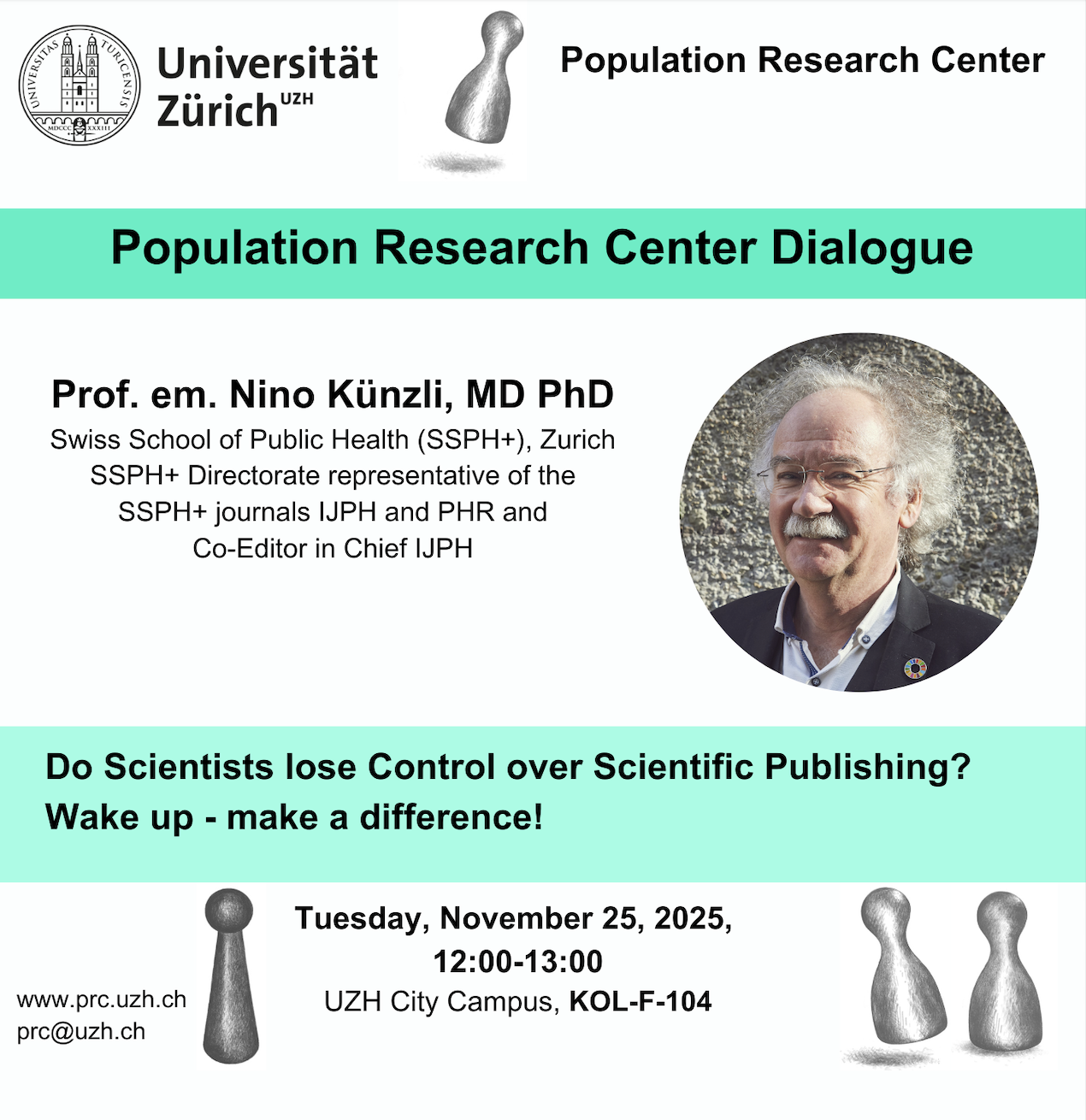
Prof. em. Nino Künzli, MD PhD
Swiss School of Public Health (SSPH+), Zurich
SSPH+ Directorate representative of the SSPH+ journals IJPH and PHR and Co-Editor in Chief IJPH
For centuries, scientists acted as editors of journals to lead the peer review and all related decisions whereas publishers took responsibility for the technical publishing services. Publishers sold intransparent subscriptions to libraries and readers of scientific papers. These paywalls provide gigantic revenues to shareholders with margins of profit often as high as 30-40% or to societies or associations. This century brought fundamental changes. Leading funders and academic decision makers now require Open Access (OA) publishing – thus free access for readers – by default, in particular for publicly funded research. Leading traditional mega-publishers such as Elsevier. Springer Nature and others lobbied against the OA model to postpone the transition as long as possible to protect revenues while preparing the OA business in combination with subscriptions (i.e hybrid OA) and the launching of new OA journals. In parallel, many new publishers emerged based on the Gold OA business model where publishing gets financed via Article Processing Charges (APC) paid by the authors of an accepted article.
The unethical hybrid OA and the fundamental shift to Gold OA fostered and amplified unprecedented conflicts of interest in the publishing model. Much is discussed about unethical business models of OA publishers such as the thousands of new OA journals where authors pay the APC to get published without any peer review – so called “predatory journals”. However, the root causes of the prevailing perversions get less attention, namely the role of us, the scientists, the academic institutions. Predatory journals, the selling of authorships, the paper mill industry, fake data, plagiarism, parallel submissions, AI based peer reviews or the charging of obscene APC fees of 10’000 and more USD for accepted papers are just the most extreme examples of obscenities that flourish for only one reason: there is demand for this market – from scientists in academic institutions. Worst of all, the prime currency driving the publishing market is not quality but the Journal Impact Factor (IF) and related scoring and ranking schemes. The IF is fostered, defended, promoted, celebrated and protected by the research community. It is the single most important determinant of many academic careers – not only in China – and, thus, this currency shapes the business strategies of publishers.
The lecture provides insights in questionable, often silent, current trends in the publishing business. If scientists continue to ignore these developments, business models of publishers will control the publishing instead of experienced independent editors dedicated to publishing good science. The lecture ends with suggestions how to wake up... and to make a difference.
| Date | Tuesday, November 25, 2025, 12:00h - 13:00h |
| Location |
UZH City Campus, KOL-F-104 |
| Slides | Slides PRC Dialogue Kuenzli 2025 (PDF, 2 MB) |

Past Events
20.5.2025: Felix Gerber and Niklaus Labhardt - Community-Based Chronic Care in rural Lesotho – innovations in health service delivery and population-based trial methodology
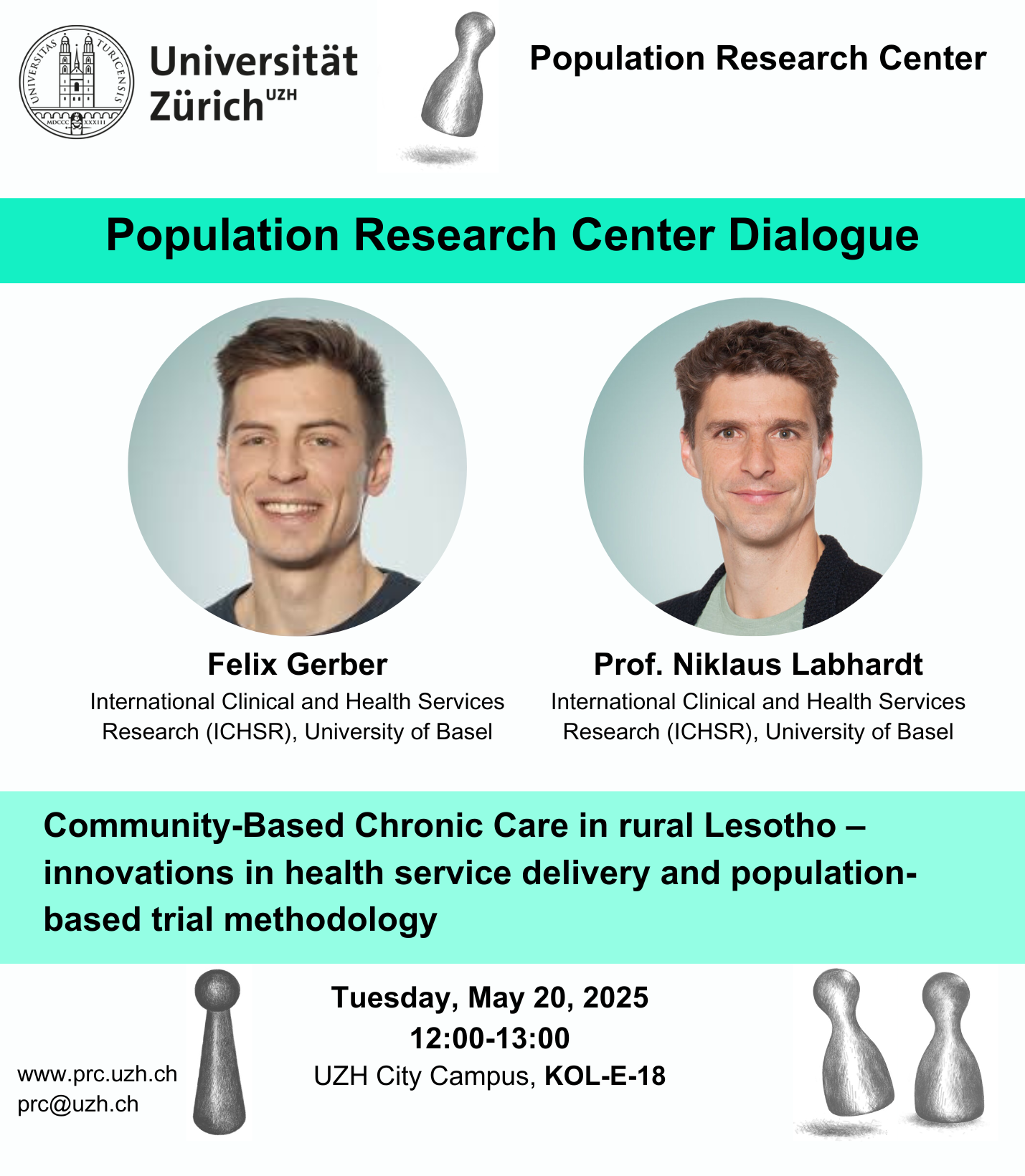
Felix Gerber andProf. Niklaus Labhardt (International Clinical and Health Services Research (ICHSR), University of Basel)
Background
The burden of chronic diseases, such as diabetes and hypertension is rapidly increasing in Africa and other low-and middle-income countries (LMICs). Leveraging Community Health Workers (CHWs) may allow to scale-up access to essential chronic care services. Previous studies have shown the feasibility of CHW-led screening, education, and referral interventions for NCDs. However, their effectiveness has been constrained by the lack of medication prescription authority for CHWs. Enabling CHWs to independently provide pharmacological treatment, could unlock the full potential of CHW-led interventions regarding access to care, clinical outcomes, and health system efficiency. Currently, there is no evidence on the feasibility, safety and effectiveness of CHW-led interventions that include independent drug prescription for hypertension or diabetes.
Methods
To assess chronic disease prevalences and risk factors and to address the question on safety and effectiveness of CHW-led diabetes and hypertension care with independent drug prescription, we established the population-based ComBaCaL (Community-Based chronic Care Lesotho) cohort and conducted three nested cluster-randomized trials. First, a baseline assessment of chronic disease prevalence and risk factors was conducted among 14,735 cohort participants across 103 randomly selected villages in rural Lesotho. Subsequently, villages were randomized to compare CHW-led hypertension and diabetes interventions with professional facility-based care. 252 participants with diabetes were enrolled in a nested trial assessing the safety and effectiveness of a CHW-led diabetes intervention. 547 participants with uncontrolled hypertension and 805 with controlled hypertension were enrolled in separate trials assessing the safety and effectiveness of a CHW-led hypertension intervention.
Findings
The ComBaCaL cohort baseline assessment revealed a diabetes prevalence of 4%, a hypertension prevalence of 17% and a self-reported HIV prevalence of 15% among participants in rural Lesotho associated with multifaceted socioeconomic and behavioral risk factors. The nested diabetes trial showed that CHW-led diabetes care including first-line drug prescription is feasible, safe and improves engagement in care with a non-significant trend toward improved blood glucose control. The trial including participants with uncontrolled hypertension showed that CHW-led hypertension care including first-line drug prescription is feasible, safe, improves blood pressure control and engagement in care. The trial including participants with controlled hypertension is ongoing.
Conclusion
Chronic diseases pose a relevant burden even in remote rural areas. CHW-led hypertension and diabetes care with independent drug prescription may be recommended to improve access to care and health outcomes. particularly in areas with limited access to professional care.
| Date | Tuesday, May 20, 2025, 12:00h - 13:00h |
| Location |
UZH City Campus, KOL-E-18 |
3.3.2025: Fan Li - Correcting for bias due to mismeasured exposure in mediation analysis with a survival outcome
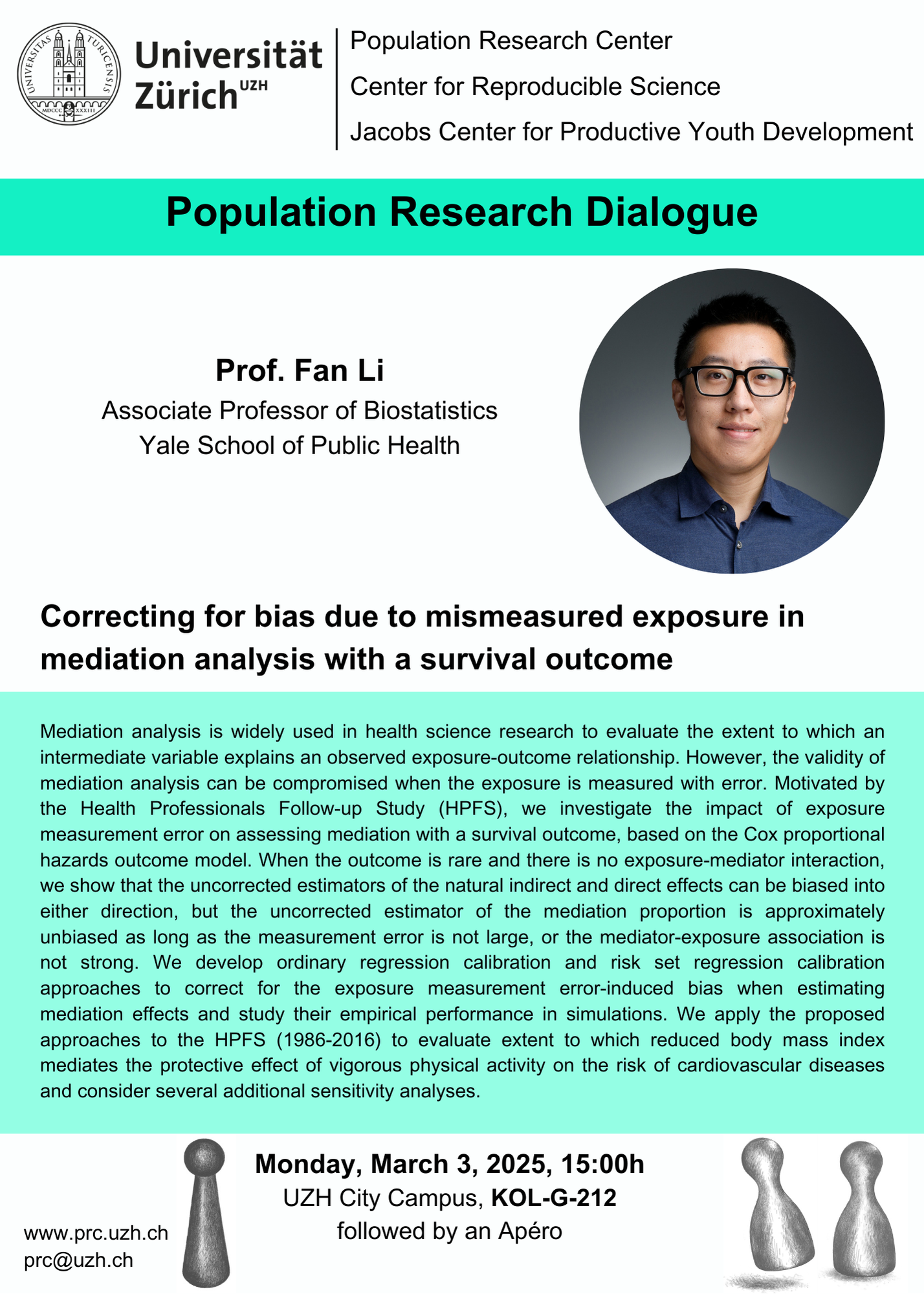
Fan Li, Associate Professor of Biostatistics (Yale School of Public Health)
Mediation analysis is widely used in health science research to evaluate the extent to which an intermediate variable explains an observed exposure-outcome relationship. However, the validity of mediation analysis can be compromised when the exposure is measured with error. Motivated by the Health Professionals Follow-up Study (HPFS), we investigate the impact of exposure measurement error on assessing mediation with a survival outcome, based on the Cox proportional hazards outcome model. When the outcome is rare and there is no exposure-mediator interaction, we show that the uncorrected estimators of the natural indirect and direct effects can be biased into either direction, but the uncorrected estimator of the mediation proportion is approximately unbiased as long as the measurement error is not large, or the mediator-exposure association is not strong. We develop ordinary regression calibration and risk set regression calibration approaches to correct for the exposure measurement error-induced bias when estimating mediation effects and study their empirical performance in simulations. We apply the proposed approaches to the HPFS (1986-2016) to evaluate extent to which reduced body mass index mediates the protective effect of vigorous physical activity on the risk of cardiovascular diseases and consider several additional sensitivity analyses.
Event co-organized by Population Research Center (PRC), Center for Reproducible Science (CRS), and Jacobs Center for Productive Youth Development.
| Date | Monday, March 3, 2025, 15:00h - 16:30h (followed by an Apéro) |
| Location |
UZH City Campus, KOL-G-212 |
4.6.2024: Andreas Edel - Science for Policy: Demography in 1662 and 2024
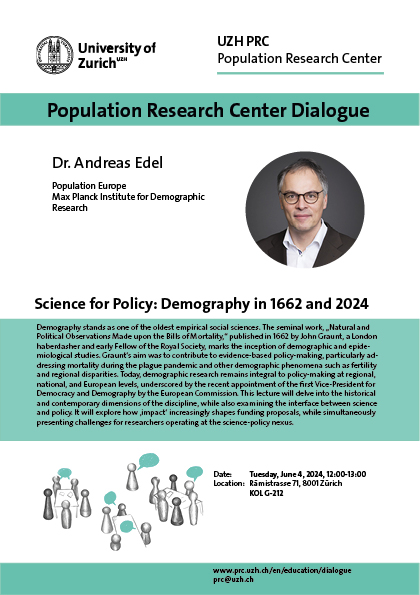
Dr. Andreas Edel (Population Europe / Max Planck Institute for Demographic Research)
Demography stands as one of the oldest empirical social sciences. The seminal work, "Natural and Political Observations Made upon the Bills of Mortality," published in 1662 by John Graunt, a London haberdasher and early Fellow of the Royal Society, marks the inception of demographic and epidemiological studies. Graunt's aim was to contribute to evidence-based policy-making, particularly addressing mortality during the plague pandemic and other demographic phenomena such as fertility and regional disparities. Today, demographic research remains integral to policy-making at regional, national, and European levels, underscored by the recent appointment of the first Vice-President for Democracy and Demography by the European Commission. This lecture will delve into the historical and contemporary dimensions of the discipline, while also examining the interface between science and policy. It will explore how 'impact' increasingly shapes funding proposals, while simultaneously presenting challenges for researchers operating at the science-policy nexus.
Andreas Edel has served as the Executive Secretary of Population Europe, the network comprising Europe’s foremost demographic research centers, since 2009. Previously, he held the position of Akademischer Geschäftsführer (Chief Research Co-ordinator) at the Max Planck Institute for Demographic Research from 2004 to 2009, and served as the Deputy Director of the Max Planck International Research Network on Ageing from 2007 to 2009. Prior to his tenure at the Max Planck Institute, he worked as a coordinator for European projects at the Wissenschaftskolleg zu Berlin – Institute for Advanced Study from 2001 to 2004, and as a historian at the Universities of Munich and Regensburg.
| Date | Tuesday, June 4, 2024, 12:00h - 13:00h |
| Location |
UZH City Campus, KOL G-212 |
19.9.2023: Laura C. Rosella - Artificial intelligence and public health
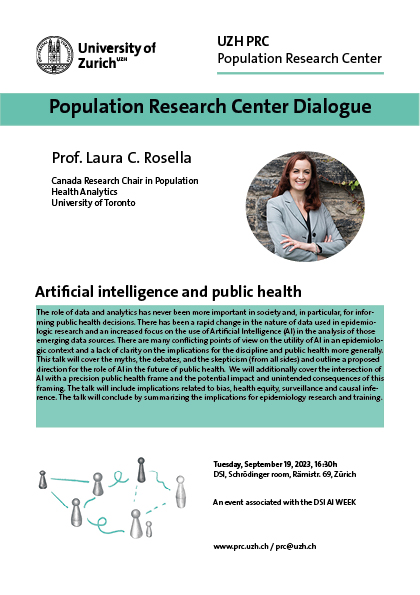
Prof. Laura C. Rosella (Canada Research Chair in Population Health Analytics, University of Toronto)
The role of data and analytics has never been more important in society and, in particular, for informing public health decisions. There has been a rapid change in the nature of data used in epidemiologic research and an increased focus on the use of Artificial Intelligence (AI) in the analysis of those emerging data sources. There are many conflicting points of view on the utility of AI in an epidemiologic context and a lack of clarity on the implications for the discipline and public health more generally. This talk will cover the myths, the debates, and the skepticism (from all sides) and outline a proposed direction for the role of AI in the future of public health. We will additionally cover the intersection of AI with a precision public health frame and the potential impact and unintended consequences of this framing. The talk will include implications related to bias, health equity, surveillance and causal inference. The talk will conclude by summarizing the implications for epidemiology research and training.
Tuesday, September 19, 2023, 4:30PM until 5:30PM, Rämistrasse 69, Zürich, SOC E-006
This event is associated with the DSI AI week.